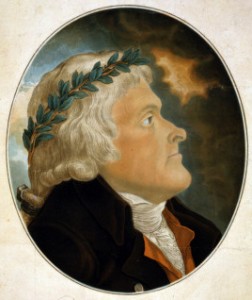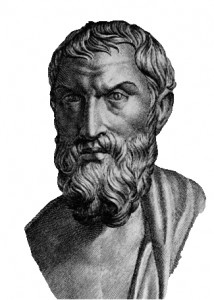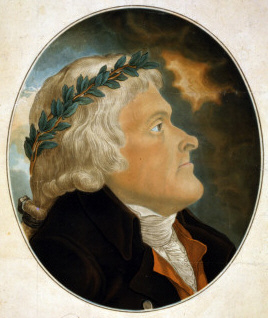Master and Student: Epicurus and Jefferson on the Changing Aspects of Justice

 Key Doctrines 37 and 38 state the Epicurean principle that “justice” does not exist in Plato’s forms, religions’ revelations, or in any way outside of the happiness of those men who are concerned to secure that happiness at any particular place and time. It is interesting to observe how these principles were plainly stated by the Master and then applied by the Student two thousand years later:
Key Doctrines 37 and 38 state the Epicurean principle that “justice” does not exist in Plato’s forms, religions’ revelations, or in any way outside of the happiness of those men who are concerned to secure that happiness at any particular place and time. It is interesting to observe how these principles were plainly stated by the Master and then applied by the Student two thousand years later:
Doctrine 37. Among those actions which the law sanctions as just, that which is determined to be of mutual advantage is in fact just whether or not it is universally regarded to be so. But if a law, once established, is determined not to be mutually advantageous, then it is by nature unjust. As to those laws which were at first just, but later become unjust, such laws were in fact just for the period in which they were of mutual advantage, at least in the eyes of those who do not confound themselves with empty words, but look to the actual facts.
Doctrine 38. Where actions which were formerly considered to be just under former circumstances are seen not to accord with the general concept of mutual advantage, then they are seen not to have been just. But actions which were in fact of mutual advantage and therefore just at one time under former circumstances, but cease being of mutual advantage under new circumstances, cease also being just.
From Thomas Jefferson’s letter to Samuel Kercheval:
Some men look at constitutions with sanctimonious reverence, and deem them like the arc of the covenant, too sacred to be touched. They ascribe to the men of the preceding age a wisdom more than human, and suppose what they did to be beyond amendment. I knew that age well; I belonged to it, and labored with it. It deserved well of its country. It was very like the present, but without the experience of the present; and forty years of experience in government is worth a century of book-reading; and this they would say themselves, were they to rise from the dead. I am certainly not an advocate for frequent and untried changes in laws and constitutions. I think moderate imperfections had better be borne with; because, when once known, we accommodate ourselves to them, and find practical means of correcting their ill effects.
But I know also, that laws and institutions must go hand in hand with the progress of the human mind. As that becomes more developed, more enlightened, as new discoveries are made, new truths disclosed, and manners and opinions change with the change of circumstances, institutions must advance also, and keep pace with the times. We might as well require a man to wear still the coat which fitted him when a boy, as civilized society to remain ever under the regimen of their barbarous ancestors. It is this preposterous idea which has lately deluged Europe in blood. Their monarchs, instead of wisely yielding to the gradual change of circumstances, of favoring progressive accommodation to progressive improvement, have clung to old abuses, entrenched themselves behind steady habits, and obliged their subjects to seek through blood and violence rash and ruinous innovations, which, had they been referred to the peaceful deliberations and collected wisdom of the nation, would have been put into acceptable and salutary forms. Let us follow no such examples, nor weakly believe that one generation is not as capable as another of taking care of itself, and of ordering its own affairs.

